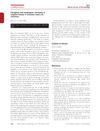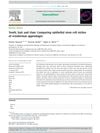 7 citations,
September 2017 in “Scientific Reports”
7 citations,
September 2017 in “Scientific Reports” Mice with too much sPLA₂-IIA have hair loss and poor wound healing due to abnormal hair growth and stem cell depletion.
 5 citations,
January 2012 in “Biological & Pharmaceutical Bulletin”
5 citations,
January 2012 in “Biological & Pharmaceutical Bulletin” Hura crepitans and its compound daphne factor F3 may help treat hair loss by blocking a specific hair growth inhibitor.
 December 2017 in “British Journal of Dermatology”
December 2017 in “British Journal of Dermatology” Targeted therapy for skin cancer is complex due to the role of the hedgehog pathway in both cancer and hair growth.
 185 citations,
December 2011 in “Molecular and cellular endocrinology”
185 citations,
December 2011 in “Molecular and cellular endocrinology” Skin cells produce and activate vitamin D, which regulates skin functions and supports hair growth.
 122 citations,
July 2005 in “The FASEB journal”
122 citations,
July 2005 in “The FASEB journal” Hair follicles produce and respond to melatonin, affecting hair growth and sensitivity to estrogen.
 41 citations,
June 2006 in “Journal of Investigative Dermatology”
41 citations,
June 2006 in “Journal of Investigative Dermatology” Beard and scalp hair cells have different gene expressions, which may affect beard growth characteristics.
 14 citations,
February 2014 in “Experimental Cell Research”
14 citations,
February 2014 in “Experimental Cell Research” The conclusion is that teeth, hair, and claws have similar stem cell niches, which are important for growth and repair, and more research is needed on their regulation and potential markers.
 9 citations,
May 2021 in “Archives of Dermatological Research”
9 citations,
May 2021 in “Archives of Dermatological Research” Home-based skin care devices are generally safe and effective for hair removal, promoting hair growth, treating wrinkles and acne, but results for psoriasis treatment are mixed.
 6 citations,
February 2014 in “Experimental Dermatology”
6 citations,
February 2014 in “Experimental Dermatology” Hair follicle regeneration is possible but challenging, especially in humans, due to the need for specific cells and a better understanding of how they signal growth.
 3 citations,
June 2021 in “Cosmetics”
3 citations,
June 2021 in “Cosmetics” A mix of sulforaphane, L-menthol, and dexpanthenol could help increase hair growth and reduce hair loss.
 153 citations,
October 2012 in “Skin Pharmacology and Physiology”
153 citations,
October 2012 in “Skin Pharmacology and Physiology” Caffeine in cosmetics may reduce cellulite, protect skin, and stimulate hair growth, but more research is needed on its use and effects.
 61 citations,
January 2018 in “Cosmetics”
61 citations,
January 2018 in “Cosmetics” Coffee silverskin may be a beneficial and safe ingredient for cosmetics, offering hydration, firmness, and potential hair growth benefits.
 28 citations,
November 2020 in “Journal of Controlled Release”
28 citations,
November 2020 in “Journal of Controlled Release” A new hair loss treatment uses tiny needles to deliver a drug-loaded lipid carrier, promoting hair growth more effectively than current treatments.
 May 2013 in “Trends in Urology & Men's Health”
May 2013 in “Trends in Urology & Men's Health” Male-pattern hair loss is normal, often involves hormone effects on hair follicles, and can be treated with medication or surgery, but new treatments are being researched.
 33 citations,
August 2018 in “Facial Plastic Surgery Clinics of North America”
33 citations,
August 2018 in “Facial Plastic Surgery Clinics of North America” The document explains hair biology, the causes of hair loss, and reviews various hair loss treatments.
 8 citations,
January 2015 in “Scars, burns & healing”
8 citations,
January 2015 in “Scars, burns & healing” Hair transplantation effectively treats burn scar alopecia, improving self-esteem and confidence.
 4 citations,
August 2021 in “Frontiers in Cell and Developmental Biology”
4 citations,
August 2021 in “Frontiers in Cell and Developmental Biology” Stress can cause hair loss by affecting nerve-related hair growth, and noradrenaline might help prevent this.
 1 citations,
July 2005 in “Informa Healthcare eBooks”
1 citations,
July 2005 in “Informa Healthcare eBooks” Hair follicles could be used for targeted drug delivery, with liposomal systems showing promise for this method.
 102 citations,
February 2008 in “The FASEB Journal”
102 citations,
February 2008 in “The FASEB Journal” One minoxidil-sensitive potassium channel exists in human hair follicles.
 61 citations,
July 2011 in “PLOS ONE”
61 citations,
July 2011 in “PLOS ONE” Spermidine may help reduce hair loss and deserves further testing as a treatment.
 41 citations,
September 2011 in “Journal of Ethnopharmacology”
41 citations,
September 2011 in “Journal of Ethnopharmacology” Panax ginseng extract helps mice grow hair.
 39 citations,
December 2001 in “JNCI: Journal of the National Cancer Institute”
39 citations,
December 2001 in “JNCI: Journal of the National Cancer Institute” Using a gene therapy with the Sonic Hedgehog gene helps mice regrow hair faster after losing it from chemotherapy.
 31 citations,
January 1989 in “Clinical and Experimental Dermatology”
31 citations,
January 1989 in “Clinical and Experimental Dermatology” The study tested a hair treatment and found it can help grow hair, but won't stop baldness. It's safe and works well, but needs more testing.
 30 citations,
September 2017 in “Clinics in Dermatology”
30 citations,
September 2017 in “Clinics in Dermatology” Men with common hair loss may have a higher risk of heart disease and diabetes, and should be checked for these conditions.
 25 citations,
October 2012 in “Dermatologic clinics”
25 citations,
October 2012 in “Dermatologic clinics” Laser and light treatments can effectively remove hair long-term.
 24 citations,
January 2015 in “Current problems in dermatology”
24 citations,
January 2015 in “Current problems in dermatology” The document concludes that accurate diagnosis of hair loss in children is crucial due to limited treatment options and the condition's psychological impact.
18 citations,
September 2021 in “Colloids and surfaces. B, Biointerfaces” Nanoparticles can effectively deliver spironolactone to hair follicles for treating alopecia and acne.
 13 citations,
March 2020 in “Frontiers in cell and developmental biology”
13 citations,
March 2020 in “Frontiers in cell and developmental biology” A substance called TCQA could potentially darken hair by activating certain genes and increasing melanin.
6 citations,
July 2015 in “JAAD Case Reports” Doxycycline can effectively treat hair loss caused by EGFR inhibitors.
 6 citations,
January 2013 in “Journal of Clinical and Diagnostic Research”
6 citations,
January 2013 in “Journal of Clinical and Diagnostic Research” AMH levels are higher in women with PCOS and can indicate the number of small follicles in their ovaries.



























